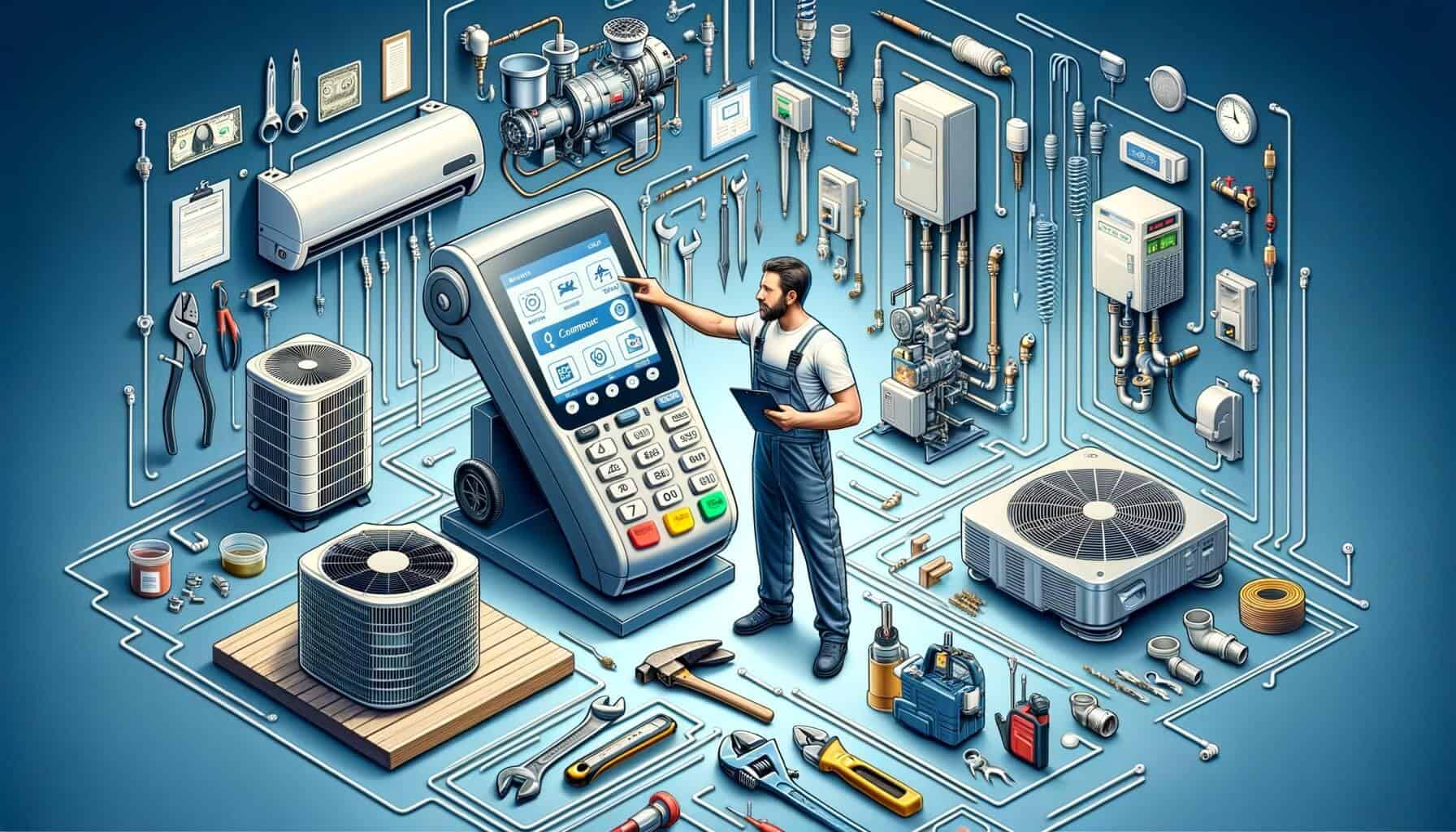
By alphacardprocess April 5, 2025
In today’s fast-paced and competitive business environment, contractors in the HVAC, plumbing, and electrician industries face unique challenges when it comes to managing their operations efficiently. One of the key tools that can greatly benefit these contractors is a customized point of sale (POS) system. A POS system tailored specifically to the needs of these industries can streamline processes, improve customer service, and enhance overall business performance.
In this article, we will explore the importance of customizing POS systems for contractors in these fields, key features to consider when customizing a POS system, and provide step-by-step guides for customizing POS systems for HVAC, plumbing, and electrician contractors.
Understanding the Importance of Customized POS Systems for Contractors

Contractors in the HVAC, plumbing, and electrician industries often have unique requirements that generic POS systems may not be able to fulfill. These industries involve complex inventory management, service scheduling, and billing processes that require specialized features and functionalities. By customizing a POS system to meet these specific needs, contractors can streamline their operations, reduce manual errors, and improve overall efficiency.
A customized POS system can provide contractors with real-time visibility into their inventory levels, allowing them to track and manage their supplies more effectively. This ensures that contractors have the necessary parts and equipment on hand when they need them, reducing downtime and improving customer satisfaction. Additionally, a customized POS system can integrate with other business software, such as accounting or project management systems, to provide a seamless flow of information and eliminate the need for manual data entry.
Key Features to Consider When Customizing a POS System for Contractors

When customizing a POS system for HVAC, plumbing, and electrician contractors, there are several key features that should be considered. These features can greatly enhance the efficiency and effectiveness of the system, providing contractors with the tools they need to succeed in their respective industries.
1. Inventory Management: A customized POS system should have robust inventory management capabilities, allowing contractors to track and manage their inventory levels in real-time. This includes features such as barcode scanning, automatic reordering, and integration with suppliers’ systems.
2. Service Scheduling: Contractors often need to schedule service appointments for their clients. A customized POS system should have a built-in scheduling feature that allows contractors to easily manage their service appointments, assign technicians, and track job progress.
3. Mobile Access: In today’s mobile-driven world, it is essential for contractors to have access to their POS system on the go. A customized POS system should have a mobile app or a responsive web interface that allows contractors to access their system from any device, anytime, anywhere.
4. Billing and Invoicing: Contractors need a POS system that can handle complex billing and invoicing processes. This includes features such as generating detailed invoices, tracking payments, and integrating with accounting software for seamless financial management.
5. Reporting and Analytics: A customized POS system should provide contractors with comprehensive reporting and analytics capabilities. This allows contractors to gain insights into their business performance, identify trends, and make data-driven decisions to improve their operations.
Step-by-Step Guide to Customizing a POS System for HVAC Contractors
Customizing a POS system for HVAC contractors involves several steps to ensure that the system meets the specific needs of the industry. Here is a step-by-step guide to customizing a POS system for HVAC contractors:
Step 1: Identify Specific Requirements: Start by identifying the specific requirements of your HVAC business. This includes understanding your inventory management needs, service scheduling processes, billing requirements, and any other unique aspects of your business.
Step 2: Research POS Systems: Research different POS systems available in the market that cater to the HVAC industry. Look for systems that offer the key features mentioned earlier, as well as any additional features that may be relevant to your business.
Step 3: Evaluate Customization Options: Once you have identified a few potential POS systems, evaluate their customization options. Look for systems that allow you to customize the user interface, workflows, and reports to match your specific requirements.
Step 4: Consult with a POS Provider: Contact the POS providers that offer the systems you are interested in and discuss your customization needs with them. They should be able to provide guidance on how their system can be customized to meet your specific requirements.
Step 5: Customize the System: Work with the POS provider to customize the system according to your specific needs. This may involve configuring the user interface, setting up inventory management features, integrating with other software, and customizing reports and analytics.
Step 6: Test and Train: Once the system has been customized, thoroughly test it to ensure that it meets your requirements and functions as expected. Train your staff on how to use the system effectively and provide ongoing support to address any issues or questions that may arise.
Step-by-Step Guide to Customizing a POS System for Plumbing Contractors
Customizing a POS system for plumbing contractors follows a similar process to customizing a system for HVAC contractors. Here is a step-by-step guide to customizing a POS system for plumbing contractors:
Step 1: Identify Specific Requirements: Identify the specific requirements of your plumbing business, including inventory management needs, service scheduling processes, billing requirements, and any other unique aspects of your business.
Step 2: Research POS Systems: Research different POS systems available in the market that cater to the plumbing industry. Look for systems that offer the key features mentioned earlier, as well as any additional features that may be relevant to your business.
Step 3: Evaluate Customization Options: Evaluate the customization options offered by the POS systems you are interested in. Look for systems that allow you to customize the user interface, workflows, and reports to match your specific requirements.
Step 4: Consult with a POS Provider: Contact the POS providers that offer the systems you are interested in and discuss your customization needs with them. They should be able to provide guidance on how their system can be customized to meet your specific requirements.
Step 5: Customize the System: Work with the POS provider to customize the system according to your specific needs. This may involve configuring the user interface, setting up inventory management features, integrating with other software, and customizing reports and analytics.
Step 6: Test and Train: Thoroughly test the customized system to ensure that it meets your requirements and functions as expected. Train your staff on how to use the system effectively and provide ongoing support to address any issues or questions that may arise.
Step-by-Step Guide to Customizing a POS System for Electrician Contractors
Customizing a POS system for electrician contractors also follows a similar process to customizing a system for HVAC and plumbing contractors. Here is a step-by-step guide to customizing a POS system for electrician contractors:
Step 1: Identify Specific Requirements: Identify the specific requirements of your electrician business, including inventory management needs, service scheduling processes, billing requirements, and any other unique aspects of your business.
Step 2: Research POS Systems: Research different POS systems available in the market that cater to the electrician industry. Look for systems that offer the key features mentioned earlier, as well as any additional features that may be relevant to your business.
Step 3: Evaluate Customization Options: Evaluate the customization options offered by the POS systems you are interested in. Look for systems that allow you to customize the user interface, workflows, and reports to match your specific requirements.
Step 4: Consult with a POS Provider: Contact the POS providers that offer the systems you are interested in and discuss your customization needs with them. They should be able to provide guidance on how their system can be customized to meet your specific requirements.
Step 5: Customize the System: Work with the POS provider to customize the system according to your specific needs. This may involve configuring the user interface, setting up inventory management features, integrating with other software, and customizing reports and analytics.
Step 6: Test and Train: Thoroughly test the customized system to ensure that it meets your requirements and functions as expected. Train your staff on how to use the system effectively and provide ongoing support to address any issues or questions that may arise.
Common Challenges and Solutions in Customizing POS Systems for Contractors

While customizing a POS system for contractors can greatly benefit their businesses, there are also common challenges that they may face during the customization process. Here are some of the common challenges and their solutions:
1. Limited Customization Options: Some POS systems may have limited customization options, making it difficult to tailor the system to specific industry needs. In such cases, contractors should consider working with a POS provider that offers more flexibility in customization.
2. Integration Issues: Integrating a customized POS system with other software, such as accounting or project management systems, can be challenging. Contractors should ensure that the POS system they choose has robust integration capabilities and work closely with the POS provider to ensure a seamless integration process.
3. Training and Adoption: Customized POS systems may have a different user interface and workflows compared to generic systems, requiring training for staff members. Contractors should invest in comprehensive training programs to ensure that their staff can effectively use the customized system.
4. Ongoing Support: Customized POS systems may require ongoing support and maintenance to address any issues or updates. Contractors should choose a POS provider that offers reliable support services and has a track record of providing timely assistance.
Frequently Asked Questions about Customizing POS for HVAC, Plumbing, and Electrician Contractors
Q1: What is a POS system?
A1: A POS system, or point of sale system, is a software and hardware solution that allows businesses to process transactions, manage inventory, and track sales. It typically includes features such as barcode scanning, inventory management, and reporting capabilities.
Q2: Why do HVAC, plumbing, and electrician contractors need customized POS systems?
A2: HVAC, plumbing, and electrician contractors have unique requirements that generic POS systems may not be able to fulfill. Customized POS systems can provide specialized features and functionalities that streamline processes, improve customer service, and enhance overall business performance.
Q3: Can a customized POS system integrate with other software?
A3: Yes, a customized POS system can integrate with other software, such as accounting or project management systems. This allows for a seamless flow of information and eliminates the need for manual data entry.
Q4: How long does it take to customize a POS system?
A4: The time it takes to customize a POS system depends on the complexity of the customization and the responsiveness of the POS provider. It is important to work closely with the POS provider to establish clear timelines and expectations.
Q5: How much does it cost to customize a POS system?
A5: The cost of customizing a POS system varies depending on the specific requirements of the business and the customization options offered by the POS provider. It is recommended to obtain quotes from multiple providers and compare the costs and features before making a decision.
Conclusion
Customizing a POS system for HVAC, plumbing, and electrician contractors can greatly benefit their businesses by streamlining processes, improving customer service, and enhancing overall efficiency. By identifying specific requirements, researching POS systems, evaluating customization options, consulting with a POS provider, customizing the system, and testing and training, contractors can create a customized POS system that meets their unique needs.
While there may be challenges along the way, such as limited customization options or integration issues, these can be overcome with careful planning and working closely with the POS provider. Ultimately, a customized POS system can help contractors in these industries stay competitive, improve their operations, and achieve greater success.